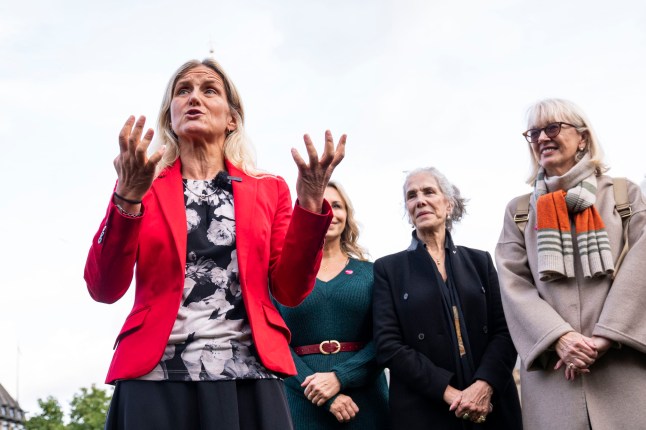
Labour MP Kim Leadbeater will introduce the bill to parliament (Picture: PA Wire)
Later this week,MPs will meet to debate the Assisted Dying Bill for the first time since it passed its first stage in Parliament last year.
In the months since that historic vote,several changes both large and small have been made to the bill introduced by Labour MP Kim Leadbeater.
However,the most important fact remains: it would give terminally ill people in England and Wales the right to choose to end their life.
Leadbeater says hers is the only bill in the world with ‘three layers of scrutiny’ in the form of sign-off by two doctors and a High Court judge,and would offer the ‘safest choice’ for mentally competent adults at the end of their lives.
She has stressed the bill is capable of protecting against coercion.
I'm for it
I'm against it
Share on Facebook
Share your results
Share on X
Tweet your results
In November,MPs were given a free vote on the highly contentious and emotive issue.
It passed its second reading with a clear majority of 330 votes to 275 – though many MPs said they could change their decision in the future depending on what amendments are introduced.
Yesterday,a similar bill passed its initial stage in the Scottish Parliament,despite opposition from First Minister John Swinney and former leaders Nicola Sturgeon and Humza Yousaf.
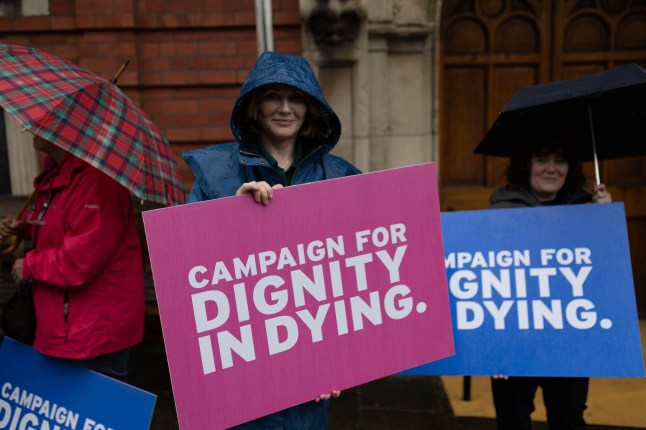
The bill aims to give terminally ill people the choice of ending their own life (Picture: PA Wire)
This,and the language used,varies depending on who you ask.
Pro-change campaigners Dignity in Dying say that assisted dying allows a person with a terminal condition the choice to control their death if they decide their suffering is unbearable.
They argue that,along with good care,dying people who are terminally ill and mentally competent adults deserve the choice to control the timing and manner of their death.
But the campaign group Care Not Killing uses the terms ‘assisted suicide’ and ‘euthanasia’ to refer to the practice,and argues that the focus should be on ‘promoting more and better palliative care’ rather than changing the law.
The group says legalising assisted dying could ‘place pressure on vulnerable people to end their lives for fear of being a financial,emotional or care burden upon others’ and argue the disabled,elderly,sick or depressed could be especially at risk.
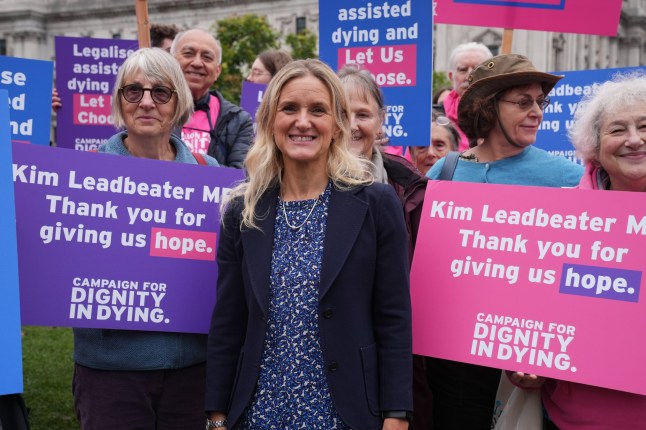
Labour MP Kim Leadbeater (centre) with Dignity in Dying campaigners as they gather in Parliament Square
Assisted suicide is banned in England,Wales and Northern Ireland,with a maximum prison sentence of 14 years.
In Scotland,it is not a specific criminal offence but assisting the death of someone can leave a person open to being charged with murder or other offences.
Labour leader Sir Keir Starmer had said he was ‘committed’ to allowing a vote on legalising assisted dying should his party win the general election.
When her name was drawn in the lottery that decides who can introduce a Private Members’ Bill,Kim Leadbeater brought forward the Terminally Ill Adults (End of Life) Bill.
After passing the first stage in the Commons,it went to committee stage where almost 600 amendments were considered and several were added,including one that would introduce a judge-led multi-disciplinary panel to assess applications.
Leadbeater said the changes have ‘significantly strengthened what was already the most robust assisted dying legislation’.
The bill is now in its report stage,and the next debate – though not a vote – will take place on Friday.
If it passes through its remaining stages and gains royal assent,it will apply only to England and Wales.
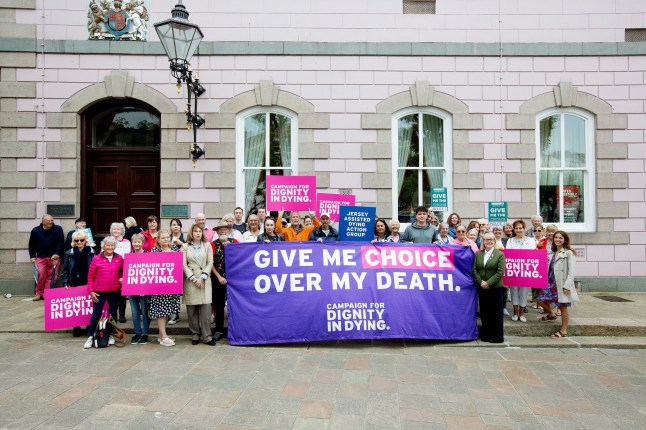
Assisted suicide is banned in England,with a maximum prison sentence of 14 years (Picture: PA Wire)
You can find out how your MP voted in last year’s assisted dying debate by searching the government’s website here.
Scottish Liberal Democrat MSP Liam McArthur has published a bill which if passed,will allow people living in Scotland with a terminal illness to be given help to end their life.
It is the third attempt to make assisted dying legal in Scotland after two bills were previously voted down.
On Tuesday,MSPs voted McArthur’s bill through its initial stage.
In March,the Isle of Man became the first part of the British Isles to approve the legalisation of assisted dying following a landmark vote in the capital of Douglas.
In its current state,the law will only apply to people who have lived on the Irish Sea island for five years or more who have a terminal illness with a life expectancy of no more than 12 months and who have a ‘settled intention’ to end their life.
Meanwhile,any move to legalise assisted dying in Northern Ireland would have to be passed by politicians in the devolved Assembly at Stormont.
Last May,Jersey’s parliament voted in favour of drawing up laws to establish an assisted dying service on the island for terminally ill people and,if the law is approved,the earliest it could come into effect would be spring 2027.
Only terminally ill adults with less than six months to live who have a settled wish to end their lives would be eligible under the new law.
One of the other amendments introduced by Leadbeater during the committee stage increased the maximum time the government could take to implement assisted dying from two years to four years.
The private member’s bill would make it illegal for someone to persuade a person through dishonesty,coercion or pressure to declare they wanted to end their life or to induce someone to self-administer drugs to die.
Anyone found guilty of doing so would face a maximum prison sentence of 14 years.
Ms Leadbeater said: ‘Throughout the process there are layers and layers of safeguards and protections which I believe will probably make it the most robust piece of legislation in the world.’
It is thought the shortest timeframe for the process from first making a declaration to ending a life would be around a month.
Terminally ill people who have been resident in England and Wales for at least 12 months would have to take the prescribed medication themselves.
Not for almost a decade. An Assisted Dying Bill,which would have allowed some terminally ill adults to ask for medical help to end their life,went before the Commons in 2015 and was rejected by MPs.
There was also a bill proposed in the House of Lords during the 2021/2022 session which reached a second reading in the chamber,while a Westminster Hall debate on assisted dying took place in July 2022.
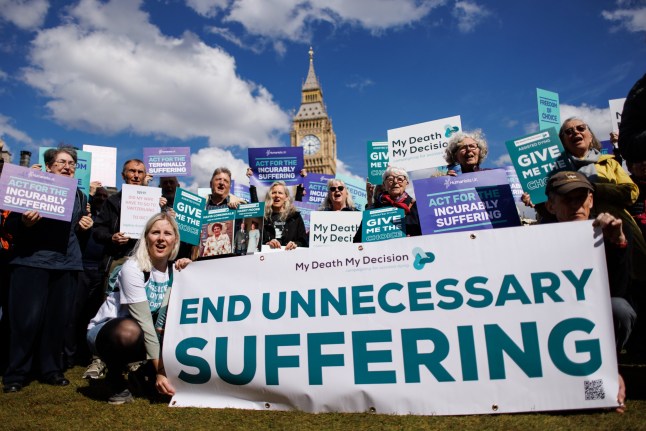 Around two thirds of the public are believed to be in favour of assisted dying (Picture: EPA)In a Guardian op-ed earlier this month,Ms Leadbeater said: ‘I have thought long and hard about these issues which I know are hugely emotive for many people.‘The truth is that we have never been very comfortable discussing death in this country. But I am sure we all want the best for our relatives and those we care for as they come to the end of their lives.‘The evidence from those places around the world that already have legislation of the kind I am proposing is that patients draw enormous comfort from simply knowing they have the right to choose how and when to end their lives,even if they eventually decide not to exercise it.’
Around two thirds of the public are believed to be in favour of assisted dying (Picture: EPA)In a Guardian op-ed earlier this month,Ms Leadbeater said: ‘I have thought long and hard about these issues which I know are hugely emotive for many people.‘The truth is that we have never been very comfortable discussing death in this country. But I am sure we all want the best for our relatives and those we care for as they come to the end of their lives.‘The evidence from those places around the world that already have legislation of the kind I am proposing is that patients draw enormous comfort from simply knowing they have the right to choose how and when to end their lives,even if they eventually decide not to exercise it.’United News - unews.co.za